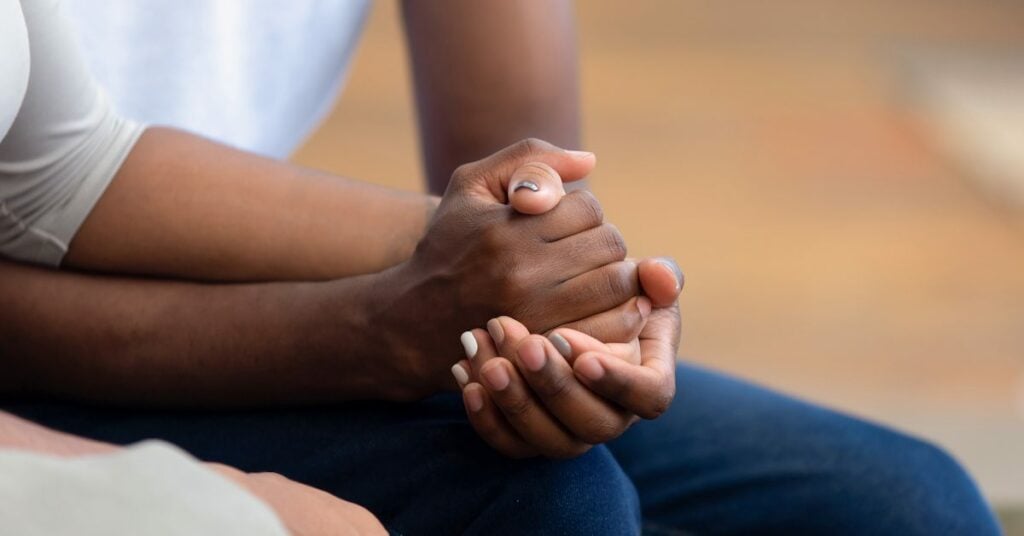The slow burn of anticipatory grief
Reviewed by Susan Radzilowski, MSW, LMSW, ACSW


Michał Sterzycki was just 26 years old when his girlfriend of two years, Noëlle Gray, was diagnosed with breast cancer at age 35. “It was her very first mammogram, and she had to fight to even get one that young,” says Sterzycki.


Shortly after her first treatment, Gray pinned Sterzycki against a wall and begged him to leave her. “She was angry, trying to scare me off,” he says. Instead, he proposed a month later.
What Sterzycki and Gray didn’t know was that her painful first round of treatment, including breast reconstruction, was just the beginning. Gray was declared cancer-free for five years, only to have the disease return in her brain and lungs. “You never really believe the cancer’s gone,” says Sterzycki. “You live with the constant threat of it coming back.”
It did come back—with a vengeance. In early 2019, after three more years of treatment, Gray died, surrounded by her friends and family.
“I was a mess,” says Sterzycki. “There is no way to prepare for this.”
Grieving in advance
In addition to grieving Gray’s death, Sterzycki lived through what mental health professionals call anticipatory grief (or preparatory grief), which can happen when you’re faced with an impending loss.1 This particular form of grief often means you get more time with a loved one, but it can also turn into a long road that grows harder as you near the end.
It’s normal to have complex feelings when someone you love passes away, but managing anticipatory grief can be a real roller-coaster ride. “There’s a whole spectrum of emotions that can be experienced,” says grief counseling specialist Jasmine Cobb, LCSW. “That may be confusing for some, but it is possible for negative and positive emotions to coexist.”
Cobb, who lost her own mother to complications from metastatic breast cancer in 2020, says grief looks different for everyone. Someone might experience anger, dread, sadness, and stress, but also relief and even happiness—and it can vary just as much for the diagnosed person as it does for those who love them. When Gray was initially diagnosed in 2007, Sterzycki says, she was determined and hopeful. But there were periods, especially around her mastectomy and reconstructive surgery, when she felt depressed and anxious.
Sterzycki experienced a range of emotions, too. “I’d always wanted to be a father, but that choice was taken from me,” he says. “I was heartbroken, but I had to accept that and move on. Your grief almost becomes a progression. You think, ‘Okay, life is just like this now.’” But he also remembers periods of joy and pride. “Noëlle was incredibly strong and independent,” he says with a smile.
Cobb says many caretakers and family members struggle with guilt during a loved one’s illness and after their death. “On the one hand, you’re sad that your loved one is gone. But you might feel a sense of relief that they’re not suffering any longer or that your role as caretaker is over,” she says.
Gray felt guilty as well, Sterzycki says. “She would tell our friends she felt bad that she was still here, and she saw herself as in the way of what I’d wanted in life,” he explains. “Which, of course, was not true.”
While anticipatory grief is tied most closely to the illness and death of someone you love, Cobb says it can be tied to other major life events, like losing a job or housing, getting divorced, or seeing your kids move out. Anytime an imminent change sets off a tidal wave of mixed emotions, you may be experiencing anticipatory grief.
How anticipatory grief works
When a terminal illness allows you and your loved ones more time together, people might assume that it’s easier or offers more closure than a sudden loss. Cobb says that’s not always the case.
Anticipatory grief doesn’t necessarily provide closure. It’s common to think that because you’ve had time to process what’s coming, a sense of peaceful finality will be easier to come by. But because grief is cyclical, Cobb says, the emotional ups and downs may be hard to manage. That doesn’t mean you’ll feel unresolved forever, though. “There’s a possibility of learning to cope with the loss and then moving to adaptation,” says Cobb. “Meaning you learn to cope in the short term, then eventually adapt to life without your loved one, which is an ongoing process.”
Anticipatory grief isn’t easier. Sterzycki rolls his eyes at the notion that having had more time with Gray before her death somehow made the end less painful. “‘Relief’ is not a word that comes to mind about any of this,” he says. “It’s just a progression. It’s accepting that this is the way life is now, and then having to go on.” Sterzycki remembers certain milestones as particularly hard, like the loss of Gray’s physical and mental capacities, and he adds that waiting can actually make the grieving process more difficult.
Anticipatory grief doesn’t come quietly. Some may imagine that anticipatory grief is like a hot bathtub you can slide into and get used to over time. Not so, says Cobb: “Even though it’s anticipated, this grief can still feel sudden.”
Anticipatory grief doesn’t affect everyone. Research has shown that certain preexisting conditions make people more susceptible to anticipatory grief. Factors such as a dependent relationship, loss of spirituality, poor support system, or inability to accept the impending death can all result in a deeper level of this type of grief.2
Healing through grief
In many ways, anticipatory grief mirrors what we traditionally feel when we lose someone or something meaningful in our lives. What sets it apart is the prolonged exposure, Cobb says, but there are ways to lessen the mental health challenges associated with this type of grief.
Start by exploring what you’re feeling. Working with a therapist, especially one trained in grief, can help you differentiate between sadness, depression, and grieving. “Sadness comes and goes,” says Cobb. “If you’re consistently sad and it’s tied to the circumstance of the loss, then it’s likely grief—and grief, left untreated, can develop into depression.”
Cobb also suggests that both the person who’s terminal and their caretaker start seeing a therapist early in the process. Sterzycki regrets not looking for professional support at that moment. “I’m in therapy now,” he says, “but I wish I’d had it as a support for myself when Noëlle was sick, and I really think she would have benefited from it.”
In addition to cognitive behavioral therapy, which Cobb recommends, acceptance and commitment therapy may help lessen symptoms of anticipatory grief.3 When a patient is more likely to accept their condition, both the patient and their caretaker can benefit.
If you’re looking for a therapist to support you through a difficult loss or diagnosis, help is available. Visit our directory to find a licensed professional near you who specializes in grief.
Don’t forget to refill your own cup
If you’re a caretaker for someone with a terminal illness or injury, make sure to practice self-care. “Prioritize yourself even in the midst of caring for someone else, because you can’t pour from an empty cup,” says Cobb. Self-care can be in the form of meditation, exercise, getting enough sleep, and building a support network around you.
Cobb also suggests looking for community organizations or government agencies that may be able to lighten your burden. “Even having a visiting nurse come in once or twice a week can be a huge help,” she says. If you can’t find what you need locally, the American Cancer Society offers guidance for accessing home care services, palliative care, and end-of-life care.
The passage of time
What differentiates anticipatory grief from other kinds of grief is the role played by time. When a death or other unexpected event happens suddenly, we grieve after it happens. But with anticipatory grief, we carry pain from both sides of the event.
For Sterzycki, watching Gray’s condition gradually deteriorate was difficult. “Seven years is a long time to watch someone be sick and get progressively sicker,” he says.
The silver lining of that slow process was that it enabled Gray to share part of her journey publicly, a decision Sterzycki supported. “She wanted to find resources about the breast reconstruction process and couldn’t, and she felt the doctors were not listening to her concerns. So she decided she would create a resource for other women going through this,” he says.
Gray’s project, “A Breast Cancer Photojournal,” documents the stark reality of her cancer treatment.4 “Photos of reconstruction provided by doctors are very clinical,” Sterzycki says. “She wanted to prepare women who were getting ready to do this in a real way.” We see Gray days after her initial diagnosis, then post-surgery with fresh wounds, and we follow her as she heals and then gets sick again.
It’s been three years since Gray’s death, and in some ways Sterzycki appreciates his ride on the roller coaster of anticipatory grief. It was often brutal to be in the space of her illness, but he says it was the life they were destined to have together.
He still grieves, but it’s easing—and it’s joined by gratitude for having had that time with her. If he’d left when Gray gave him the chance, he would never have gotten to witness firsthand the strength he sees captured in those photos.

Sources
About the author
Amye Archer, MFA, is the author of “Fat Girl, Skinny” and the coeditor of “If I Don’t Make It, I Love You: Survivors in the Aftermath of School Shootings,” and her work has appeared in Creative Nonfiction magazine, Longreads, Brevity, and more. Her podcast, “Gen X, This Is Why,” reexamines media from the ’70s and ’80s. She holds a Master of Fine Arts in creative nonfiction and lives with her husband, twin daughters, and various pets in Pennsylvania.
Related articles

Healing your relationship after pregnancy loss
When you’re consumed by the grief and trauma associated with pregnancy loss...

Climate change and mental health
Climate change and extreme weather events can create both acute and chronic...

Healing from the trauma of gun violence
Gun violence survivors carry the pain of past experience and the risk of...

There are many ways to lose your home, from a natural disaster to an emotional...
